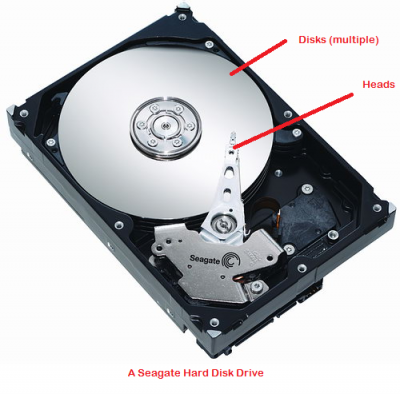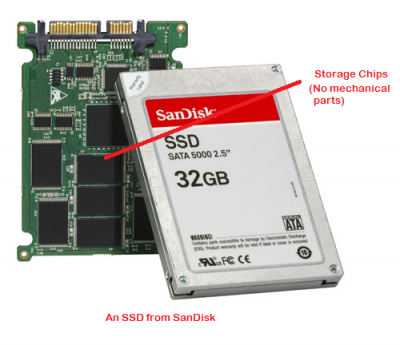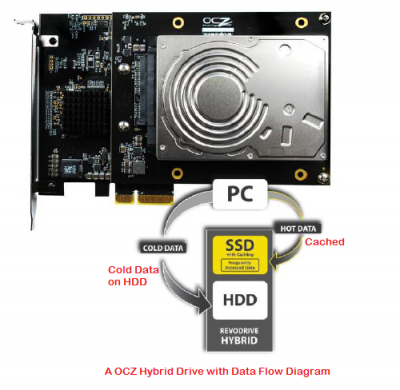With Flash storage devices picking up, you would want to know which type to buy for yourself. Solid-state Drives, or SSDs, are faster than conventional Hard Disk Drives (HDDs) but much more costly. There is a significant difference between HDDs and SSDs.
Hybrid Drive vs SSD vs HDD
This article focuses on the difference between Solid State Drives and Hard Disk Drives and then compares them to Hybrid Drives.
Hard Disk Drives (HDD)
The main points one needs to know about the Hard Disk Drives are as follows:
- Hard disks contain several disks that rotate and as many heads that move forward and backward on each disk to read/write data – The time taken to read/write data on an HDD is significant as the disks have to rotate before any action
- Movable parts mean wear and tear – The technology used in current hard drives is good and hence hard drives have a long life; this again depends on the usage of the HDD
- Hard disks do not die out all at a time – A hard disk first starts failing and then dies normally unless any brute force is applied to crush all disks at the same time (an HDD has many disks; and data on disks that are not damaged, can be still read)
- The technology used in Hard Disk Drives (HDDs) is cheap, and hence you can get large amounts of storage space for low-cost
- The Hard Drives available in the market do not need any kind of special software as any operating system easily recognizes them.
Solid State Drives (SSD)
Solid State Drives, as we have seen earlier, are also called Solid State Disks, though no disks are involved. It is just because their counterparts are often called Hard Disks, they can be called Solid State Disks. The main points to be noted are as follows:
The main points to be noted are as follows:
- There are no mechanical parts involved – There is no need to move anything inside the drive to read data and hence the time taken to read and write data is much faster compared to HDDs
- SSDs are basically complex circuits where data is stored in ON/OFF (1/0) phases – As such, there is no physical wear and tear in SSDs
- You cannot tell if an SSD is about to die; unlike the HDDs, they do not send out any kind of warning signals, and if an SSD dies out, it dies completely without allowing any more read/write operations
- The technology used in SSDs is costly, and thereby, the drives are costly compared to Hard disks; for example, if you can buy an HDD of a certain capacity for ‘n’ dollars, an SSD of the same capacity may be more.
- Solid-state Drives are addressed in a fashion similar to how the OS addresses RAM, and hence, their speed is faster than that of Hard Disks, which not only have to convert magnetic scratches into binary but also have to deal with disk rotations and moving heads.
Read: GPT or MBR: Which format should you use for SSD?
SSHD or Solid-State Hybrid Drive
A solid-state hybrid drive (SSHD) combines the best of both worlds: It’s a traditional spinning hard disk enhanced with a small amount of quick solid-state cache memory. The Hybrid Drive marries the cost-effective storage capacity of a regular HDD with some of the speed benefits of an SSD. The SSD component acts as a cache, storing frequently accessed data and improving overall performance. Unlike a dual-drive hybrid system, where separate SSD and HDD devices are installed, an SSHD integrates both functionalities into a single piece of hardware.
HDD vs SSD
Based on the above points-
- SSDs are much faster compared to Hard Disk Drives
- SSDs are much costly compared to Hard Disk Drives
- SSDs, if die, they die without any warning so you may lose your data if not already backed up
SSDs are good for people who need higher speeds, such as in gaming and real-time computing. Hard Disk Drives are okay for people who require more storage space than speed.
Read: How to tell if the Hard Drive is SSD or HDD.
Hard Disk Drive, Solid State Drive, Hybrid Drive comparison
Hybrid Drives combine both SSD and HDD where the SSD is used as a cache between Hard Disk and RAM. Hybrid Drives are actually Hard Disk Drives that employ some SSD to act as a cache. They come with firmware that figures out what data is being required frequently and stores it on the SSD part (cache) of the Hybrid Drives. This results in faster operations with time (as you use the Hybrid Drives). To make the previous statement a little more clear, you will not see any difference in the speed of Hybrid Drives initially, but as you use the Hybrid Drive – over time – you will notice that your programs and operating system (and other data) are much faster than before.
Read: How to tell if SSD is SATA or NVMe?
Hybrid Drives are good for people who need both speed and space. Being part HDD and part SSD, Hybrid Drives are less costly while providing better storage space. In comparison, Hybrid drives are faster than regular Hard Disks and slower than standalone SSDs while not compromising on storage space.
These are my observations on Hybrid Drive vs SSD vs HDD.



Question: If the SSD portion of the Hybrid dies, is the data on the Hard Disk portion of the drive still accessible?
It should be. I am yet to come across any statement that negates my theory.
Anyway, it would be saved and not ruined so you can access it using special tools if it cannot be accessed directly. But I think the SSD, being just a cache, if dies, the data on Hybrid drive can still be accessed without any problem.
Thanks Arun….
Their could be a potential for data loss if the sad portion of the drive fails.
If the data within the SSD is merely a backup of data on the HDD portion then the data loss would be minimal. However, if the data is only stored in the SSD portion then many important files will be lost.
Based on the above points,
SSDs are much faster compared to Hard Disk Drives
SSDs are more costly compared to Hard Disk Drives
SSDs can die without any warning so you may lose your data if not already backed up
If you know of a Hybrid 4TB HDD that has a SDD cache that can back up the data on the HDD PLEASE let us know!
The problem here from the two replies seems to be that some don’t seem to see what the cache portion of the drive is.
The cache is a temporary store whilst the data is written to the disc, once written the cache is emptied.
which would be a better option 1TB – SSD or 500GB Hybrid drive ?
I know this is a fairly old post, but the answers seem to have died off…
My understanding of the SSHD is not that it actually, physically stores data on the flash memory. After all, 8GB is nothing, I am not even sure that’s enough space to store Windows these days.
From looking into it, it doesn’t store the data, only the cache information needed to boot up the program, much as RAM does.
As such, if the SSD section dies, you shouldn’t lose any information as the data is physically on the HDD section.
If that seems a bit confusing, think of it like this: Say you load Diablo 3. The game needs certain files to run. The drive learns what these files are and if you frequently use them, transfers the data to the flash memory, so it loads that ‘particular’ information much faster.
The result is a drive that gets faster with your most common programs the more you use them.
Apologies if I am wrong on this and feel free to correct me :),
500GB Hybrid drive is the best option, since it’s cost is lower than an SSD. Things like Applications will run at almost the same speed as an SSD.
It’s not “much costly,” it’s “much costlier” or “more costly.”
appalling spelling full of grammatical errors. How could I ever take anything in this article serious?
lol appalling grammar.
He don’t know what he’s talking about “The technology used in Hard Disk Drives (HDDs) is cheap and hence you can get large amounts of storage space for low cost” LOL REALLY. MY SCSI hard drive are certainly NOT made with “cheap” components. Running for 8 hours now in a server and never switched off. The guy is an idiot. Needs to go back to school for his grammar / spelling and college for I.T. Idiot
I bet the authors knows multiple languages and English is not his first one. How many languages do you know you turd? And anyway who the F cares about grammar! :D
people who want to read something credible and reliable and those with the brains to interpret it. Clearly they don’t know multiple languages owing to the fact they cannot figure out the most basic most spoken one in the world :) Regards
You imbecile, the most spoken language in the world is Mandarin! Ever heard of it??
Anyway be happy in your ignorance. Over and out.
1. Mandarin Chinese
Native speakers (2010): 955 million
Non-Native speakers: 194 million2. English
Native speakers (2010): 360 million
Non-native speakers: 603 million
Depends if you go native or non speakers. Doesn’t require world war 3.
It should be – “Appalling spelling; full of grammatical errors! How could I ever take anything in this article seriously?’